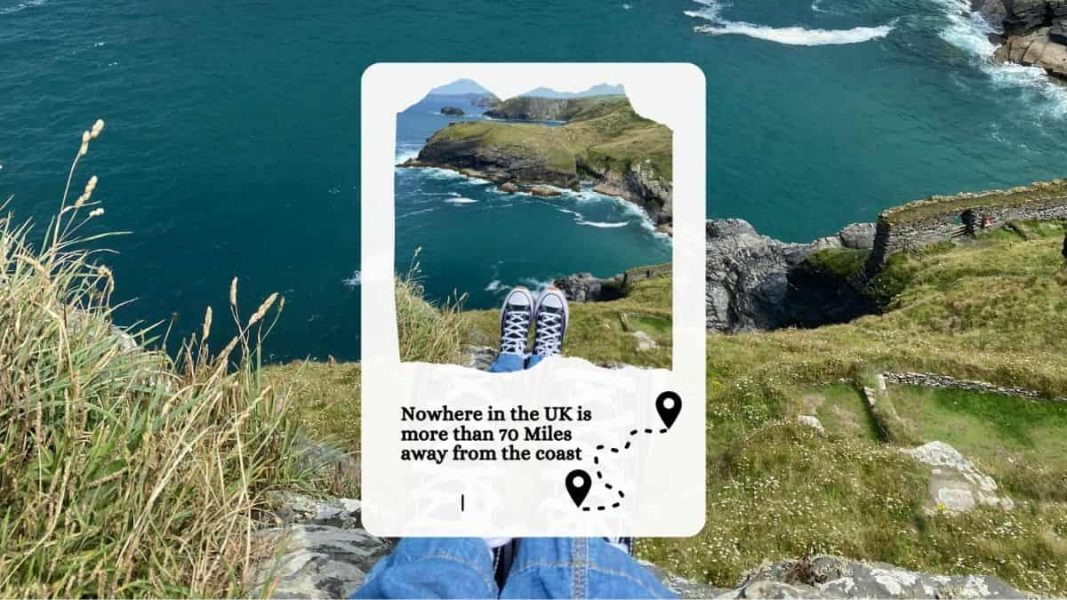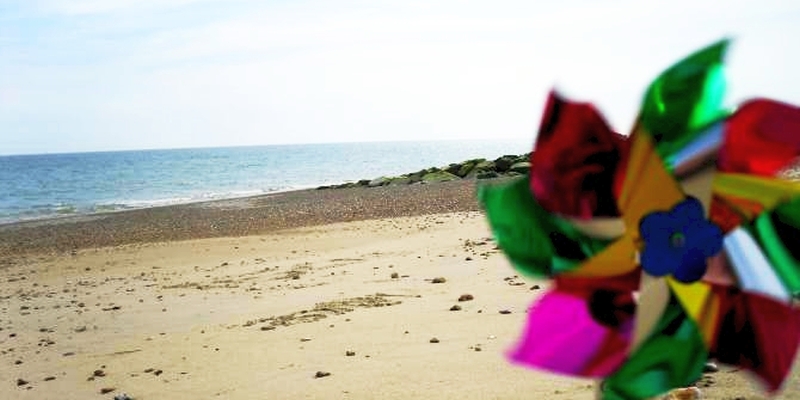
Nowhere in the UK is More Than 70 Miles from the Sea
The coast has a magnetic pull, drawing people to its shores with promises of fresh sea air, crashing waves, and endless horizons. From vibrant piers and hidden coves to windswept cliffs and golden sands, the coastline offers a little piece of paradise for everyone, whether you’re seeking adventure or simple serenity.
The beach is never far away. In the UK, the coast is not just a geographical boundary; it’s a place of history, beauty, and endless fascination. From the sandy stretches of Cornwall to the rugged cliffs of Scotland, every region offers something special.
The UK coastline is very accessible. Whether you’re hopping on a train, boarding a bus, or even taking a ferry, getting to the seaside is almost as enjoyable as being there. So, let’s pack our bags, grab a picnic, and explore the best of the UK’s coastal charm.
Why the Beach Is Always a Good Idea
There’s something undeniably magical about a trip to the beach. Perhaps it’s the rhythmic crash of the waves, the feel of warm sand underfoot, or the sense of timelessness that comes from staring out at an endless horizon. Science even backs it up: being near the ocean has been shown to reduce stress, boost mood, and improve overall well-being.
But beyond the health benefits, the beach is simply fun. Kids can lose themselves building sandcastles and searching for seashells, adults can finally relax with a good book or take a stroll along the shoreline, and thrill-seekers can dive into water sports like surfing and paddleboarding. Whether it’s a quick dip, a long walk, or just an excuse to eat chips out of a paper bag while watching seagulls squabble, the beach offers something for everyone.
Getting There Is Half the Fun
Thanks to the UK’s size, getting to the coast is remarkably easy. You’re never more than a couple of hours’ drive from the sea, even if you’re in the landlocked Midlands. Church Flatts Farm in Coton-in-the-Elms, Derbyshire, holds the title of the UK’s furthest point from the sea at just 70 miles—a detail that’s oddly comforting, as it means the beach is always within reach.
The UK’s rail network also makes coastal trips a breeze. Hop on a train from London, Manchester, or Edinburgh, and you could be sinking your toes into the sand by lunchtime. Even bus routes cater to seaside enthusiasts, with regular services to popular spots and hidden gems alike.
The South East: Beaches for Everyone
The South East’s beaches offer a wonderful mix of entertainment and tranquility, making it perfect for families, couples, or anyone needing a dose of fresh sea air. Brighton is a perennial favourite with its pebbled beach, bustling pier, and quirky shops. Trains from London whisk you to Brighton in under an hour, while buses like the Coaster service connect Brighton to picturesque spots like Eastbourne and Seven Sisters.
For something quieter, Camber Sands near Rye offers soft golden dunes and plenty of space to unwind. Coastal bus routes make it easy to explore the surrounding area, including charming Rye, with its cobbled streets and historic inns. If you fancy extending your stay, take the ferry to the Isle of Wight, a haven for walkers, cyclists, and anyone looking for unspoiled beauty.
Then there’s the White Cliffs of Dover—not a traditional beach, perhaps, but the views are so spectacular they’ll make you forget all about sand.
The South West: Rugged Beauty and Sandy Shores
The South West’s coastline is the stuff of postcards. Cornwall, with its rugged cliffs and sparkling coves, is a paradise for adventurers and beachcombers alike. Hop on a train from Bristol to Penzance, and you’re within easy reach of St Ives, Porthcurno, and the famous Fistral Beach. Many bus routes weave along the coast, offering scenic journeys past rolling hills and seaside villages.
If you’re looking for drama, the South West is the place to be. Cornwall’s coastline is a masterpiece of rugged cliffs, hidden coves, and world-class surfing spots. Fistral Beach is the go-to destination for catching waves, while Porthcurno offers a more serene escape, complete with turquoise waters that wouldn’t look out of place in the Caribbean.
Devon’s Jurassic Coast is equally spectacular, especially for fossil hunters. Coastal bus services like the Jurassic Coaster take you to hotspots such as Lyme Regis and Sidmouth, where the cliffs seem to whisper ancient secrets. Public transport even gives you perks—some attractions offer discounts if you arrive without a car.
Devon isn’t far behind, with beaches like Woolacombe delivering long stretches of sand and space for everyone. And let’s not forget the Jurassic Coast, where you can hunt for fossils or simply marvel at the cliffs that tell a story millions of years in the making.
The North East: Wild and Wonderful
The North East’s beaches often fly under the radar, but they are some of the most captivating in the country. Bamburgh Beach, with its golden sands and imposing castle backdrop, feels like stepping into a medieval storybook. Trains from Newcastle take you to Alnmouth, a short hop from Bamburgh and the magical Holy Island of Lindisfarne.
Whitby, famous for its Dracula connections, offers a blend of history and seaside charm. Its dramatic abbey ruins and cobbled streets make it a perfect weekend escape. Public transport options are excellent here, with bus routes winding along the Yorkshire coast, offering stunning views of the North Sea.
The North West: Timeless Charm
The North West serves up a delightful mix of traditional seaside fun and wild, untamed beauty. Blackpool remains the quintessential British seaside resort, complete with its iconic tower, vintage trams, and amusements galore. Frequent trains from Manchester make it an easy day trip, while buses and trams ensure you can explore the area effortlessly.
For a quieter experience, Morecambe Bay offers expansive sands and jaw-dropping sunsets. Coastal walks here are a dream, and the nearby Formby Beach, known for its dramatic dunes and red squirrels, is perfect for nature lovers.
Wales: A Coastal Paradise
Wales boasts some of the most stunning coastal scenery in the UK. Rhossili Bay in the Gower Peninsula is a regular on lists of the world’s best beaches, and it’s not hard to see why. The sweeping sands seem to stretch forever, with dramatic cliffs providing a backdrop that’s both romantic and awe-inspiring.
Cardigan Bay is another treasure, with dolphin-spotting boat trips and charming seaside towns like Aberaeron. Public transport makes these spots wonderfully accessible, with regular buses and trains connecting key coastal destinations. And for those who love a good hike, the Wales Coast Path offers 870 miles of jaw-dropping scenery.
Scotland: Majesty and Mystery
Scotland’s coastline is as varied as its whisky, with something for everyone. On the Isle of Harris, Luskentyre Beach’s white sands and turquoise waters will leave you questioning whether you’re still in the UK. Meanwhile, St Andrews offers a mix of history, golf, and sandy shores, all easily reachable by train.
For those willing to venture further, Durness in the Highlands offers a sense of wild remoteness, where cliffs meet crashing waves and time seems to stand still.
Further north, the Highlands offer some of the most remote and dramatic coastal scenery in Europe. Durness is a highlight, where towering cliffs meet untamed seas. For a real adventure, take a ferry to the Orkney or Shetland Islands, where wildlife, ancient ruins, and spectacular landscapes await.
The Call of the Wild Coast
For nature lovers, the UK’s coastline teems with life. Norfolk’s beaches are a favourite haunt for seals, while Cardigan Bay in Wales offers dolphin-spotting opportunities. Bird enthusiasts can marvel at puffins on the Farne Islands or gannets at Bass Rock in Scotland. Each region offers unique encounters with the wild beauty of coastal habitats, making every trip a chance to connect with nature.
Coastal Sports: Adventure Awaits
The UK’s coastlines are a playground for adventure. In Cornwall, you can catch world-class waves at spots like Fistral Beach or try coasteering—a thrilling mix of climbing, swimming, and diving—along rugged cliffs. Paddleboarding is popular in Devon’s serene bays, while kitesurfing enthusiasts head to Camber Sands for the perfect winds. For a gentler pace, coastal kayaking provides the chance to explore hidden coves and caves.
Why Not Go Today?
With no spot in the UK more than 70 miles from the sea, the beach is closer than you think. Whether you’re craving a spontaneous day out or planning a relaxing weekend away, the coast offers an escape like no other.
The UK’s beaches are more than just sand and sea; they are gateways to adventure, relaxation, and a deep connection with nature. Thanks to an extensive public transport network, they are also wonderfully accessible. Coastal buses like the Jurassic Coaster and Yorkshire Coastliner, train services to seaside hubs, and ferries to islands make getting to the beach part of the experience.
So why not pack a picnic, grab your sunglasses, and head to the coast this weekend? Whether you’re looking for adrenaline-fueled activities, wildlife encounters, or simply a moment of peace by the waves, the UK’s coastline has it all.
And don’t forget: World Ocean Day is on Sunday, June 8th, 2025. It’s the perfect excuse to visit the beach, celebrate the beauty of our oceans, and reflect on how lucky we are to live in such a seaside-rich country.





